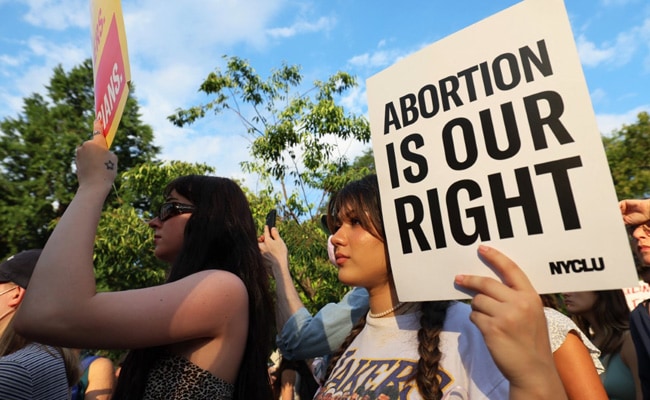
US abortion rights protests: At least eight right-wing states immediately banned abortion.
Washington:
Abortion rights defenders protested the Supreme Court’s Thunderbolt decision on Saturday for a second day across the US, as conservatives moved swiftly to ban the procedure state after state.
The deeply polarized country woke up to a new level of division: between those states that would deny abortion rights, since 1973, and those that still allow it.
After late-night protests, hundreds of people again took to the streets outside the fenced-off Supreme Court on Saturday in hot summer weather, chanting “War on Women, Who’s Next?” and “No uterus, no opinion.”
“What happened yesterday is indescribable and disgusting,” said 19-year-old Mia Stagner, the college’s major of political science. “Being forced to be a mother is not something any woman should be doing.”
Twin demonstrations were also underway in Los Angeles—one toward City Hall and the other at Federal Courtyard—with dozens of smaller rallies planned from coast to coast.
At least eight right-wing states immediately banned abortion – with an equal number to follow suit in the coming weeks – after the Supreme Court ended 50-year-old constitutional protections for the procedure, some of America’s closest allies. criticized. Worldwide.
Boosting mobilization, many now fear that the Supreme Court, made possible by Donald Trump with a clear conservative majority, may next turn its attention to rights like same-sex marriage and contraception.
President Joe Biden – who has similarly expressed concern that the court may not stop on abortion – spoke out again on Saturday against his “shocking decision”.
“I know how painful and devastating the decision is for so many Americans,” said the president, who has urged Congress to restore abortion protections as a federal law, and promised that the issue would be addressed during the November midterm elections. will be on the ballot.
Women in states that severely prohibit abortion or make it outright illegal must either continue their pregnancy, undergo covert abortion, take abortion pills, or travel to another state where it is legal.
“We’re going to see some nightmare scenarios, sadly,” Biden spokeswoman Karine Jean-Pierre told reporters on Air Force One, when the president was headed to Europe for the Group of Seven and NATO summits.
“It’s not fictional,” she said.
‘Women die due to abortion’
Friday’s demonstrations mostly went without incident – although police fired tear gas at protesters in Phoenix, Arizona, and in Iowa City Cedar Rapids a pickup truck drove through a group of demonstrators, over a woman’s leg was going on.
The scene in Washington on Saturday was once again mostly peaceful – except for the awkward shout-out match between abortion rights advocates and opponents.
Carolyn Keller, 57, who traveled all the way from New Jersey, said she was incensed by the ruling, warning: “They came after women. They will come after the LGBT community and contraception.”
But anti-protesters like Savannah Craven persisted.
“Having an abortion is not a personal choice, it involves two people and unfortunately the choice ends at the end of one’s life,” she told AFP.
As protesters like Craven made clear, while Friday’s ruling represents a victory in the religious right’s struggle against abortion, the movement’s ultimate goal is a nationwide ban.
That goal is now visible in about two dozen states, which are now expected to severely ban or outright ban and criminalize abortion.
Missouri first banned the procedure on Friday, making no exceptions for rape or incest, joining at least seven other states — Alabama, Arkansas, Kentucky, Louisiana, Oklahoma, South Dakota and Utah — on Saturday morning.
In its decision, the Supreme Court rejected the argument in Roe v. Wade that women had the right to abortion on the basis of their constitutional right to privacy in relation to their bodies.
Women in those states must either continue their pregnancy, undergo covert abortion, take abortion pills, or travel to another state where it is legal.
Several Democratic-ruled states, anticipating an influx of patients, have already taken steps to facilitate abortion, and three of them – California, Oregon and Washington – have issued a joint pledge to protect access in the wake of the court’s ruling. .
(This story has not been edited by NDTV staff and is auto-generated from a syndicated feed.)